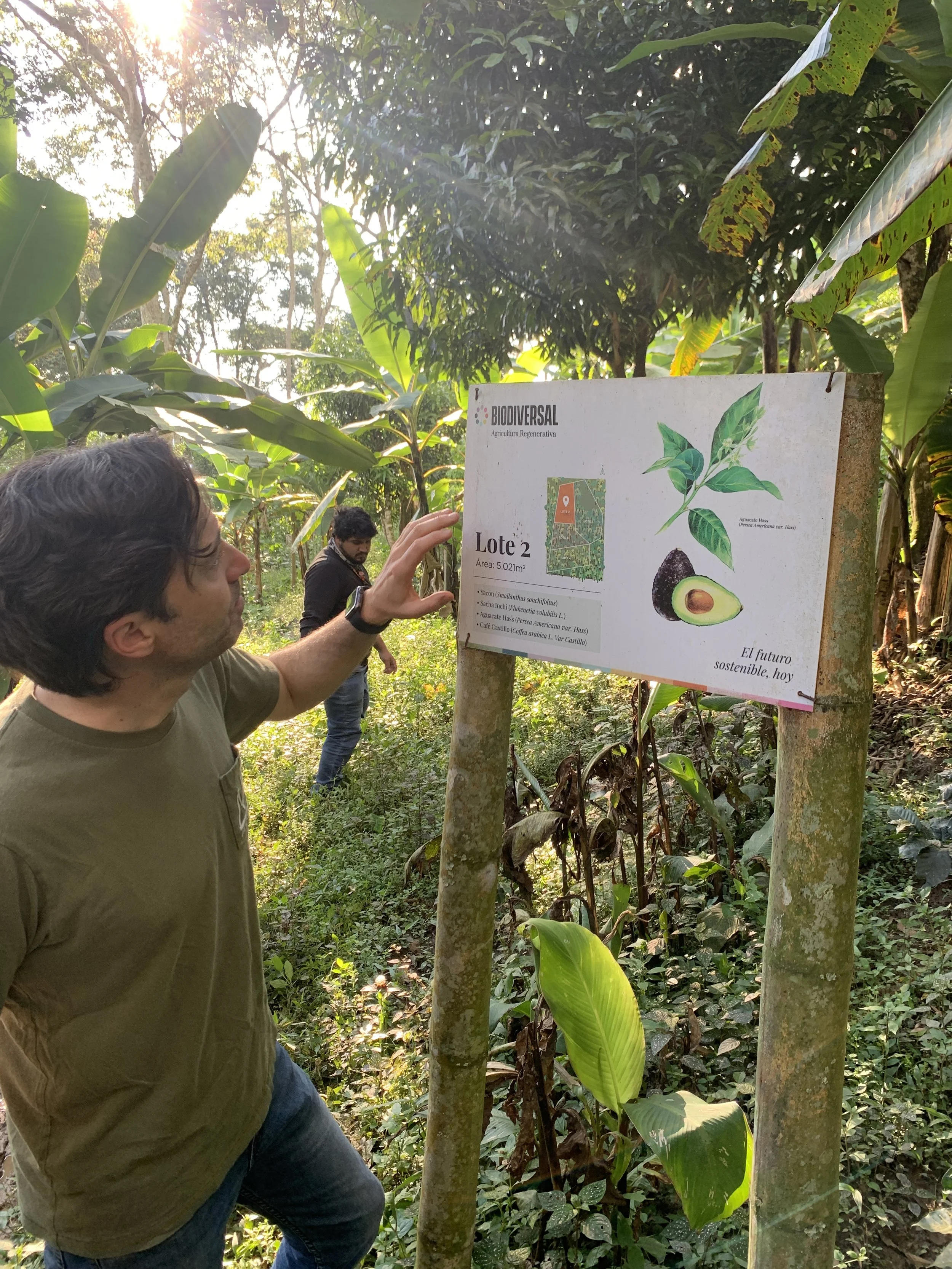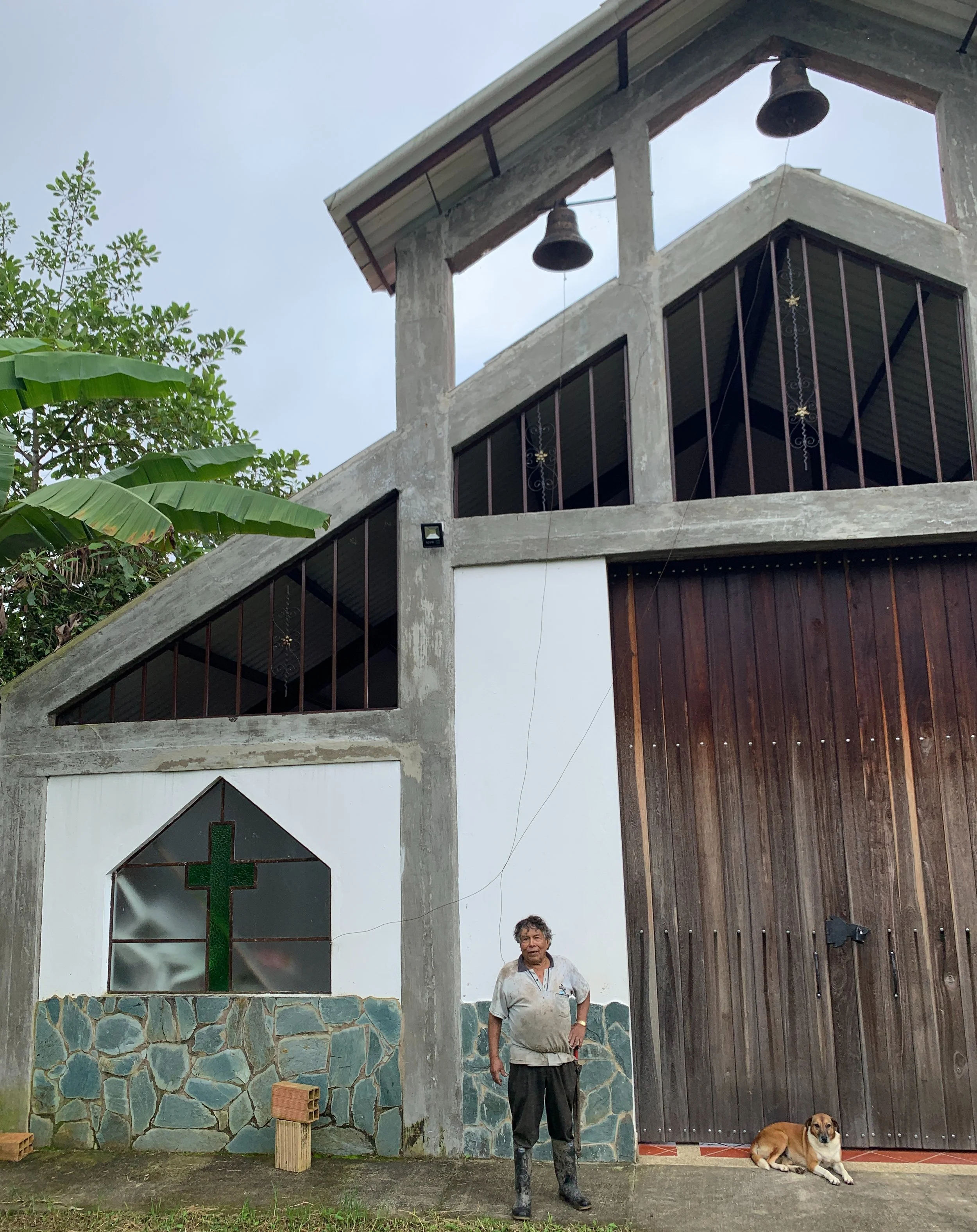From soil to cup
La Palma y El Tucan’s (LPET) agroforestry hotel steeply sits high in the Cundinamarcan hills just outside of Cachipay. As the farm’s name suggests, the land plays host to birds of many types as well as agriculture beyond coffee. In fact, every coffee lot on the property is registered and organized with the varietals planted (coffee and otherwise), their planting dates, origin, as well as the information on any vegetation purposely planted there, from cover crop to shade-offering trees.
Morning coffee in paradise.
The aim by farm owners Elisa Maria Madrinan and Felipe Sardi are to produce healthy soils, ecosystems and communities– not just in the realm of fungi, flora and fauna, but of fostering discussion and growth with their neighbours.
Over the past decade, the LPET team has been expanding their breadth in the region, buying from farmers whose quality and philosophies align with their own. Beyond simply being in the specialty coffee market, LPET is in the market of bettering their surroundings. The team’s knowledge extends to sustainable agriculture, agroforestry and the importance of shade cover, all of which result in healthier land, secondary crops to be sold and ultimately higher quality coffee. If you care for the land, the land will return in kind.
Vermicompost is at the heart of soil regeneration; the hotel’s near-zero waste output means that everything van be composted and turned into healthy soil for polyculture.
Ten years ago, the plot of land was a cattle farm– notorious for rapidly declining the quality of land. Cattle consume all the grass on a plot, deffecate and move on to the next plot; over time, nothing can grow, the soils become exhausted of nutrients and life. In the highlands, such farms are easy to spot from a mile away: interspersed amongst hillside forests are plots of grass and nothing more. On a mountainside terrain, in an area as lush as this, the sight is dramatic compared to untamed jungle.
Nonetheless, Elisa and Felipe took the challenge to breathe life back into the land. Serious thought and consideration had to be made to determine what to plant where, and when. Massive amounts of education and labour went into returning the land to a point of health, but it’s paid off. It’s hard to believe that such a place was once a scar upon the mountainside; the lushness and versatility in the vegetation suggests that this farm has always been this varied and healthy. Not only is this integral to the farm’s health, but it returns the farm to a balanced ecosystem: the natural reintroduction of animal life in the area indicates that the course has been righted. Cundinamarca’s beauty cannot be understated, profiting off the land through thoughtful and respectful agriculture is a possibility.
Felipe Sardi’s Biodiversal polyculture farm aims to exemplify ideal mountainside growing.
The Neighbours & Crops program looks to highlight the unique nature of the region. Cool climate at such an altitude means that there is a single coffee harvest per year, compared to the more common two– meaning only one chance every year to get it right. The conditions that make for the singular harvest are those that make for a spectacular terroir. Higher altitudes (up to 1700 metres above sea level) mean cooler weather, not to mention clouds rolling through the farm itself, slowing down the coffee’s development and maturation on the tree, making sure that a full range of sugars and acids develop over time.
Most of the neighbours worked with are lifelong farmers on plots of only a few hectares. Coffee tends to be their focus, ideally selling the majority of the fruit to LPET, as the prices are better than commodity pricing, and less labour is necessary on their end. Selling to the local cooperative means that the coffee must be picked, washed and dried by the farmer; LPET offers to buy the cherry freshly picked and takes care of the rest, including transport of the fruit and pickers, if necessary. It limits the farmer’s headaches, offers them a better price and comes with assistance in terms of practical polycultural education and troubleshooting help.
A neighbouring grower and partner with La Palma y El Tucan.
LPET splits their ranges between traditional and estate offerings: the former making up the bulk of production and encapsulates the Neighbours & Crops program. The estate line focuses on homegrown Geisha and Sidra coffees spanning a plethora of fermentation techniques. Most ambitious of their fermentation techniques is a process wherein the estate’s character has been captured, distilled and propagated in order to create a unique fermentation environment for the cherry that they’ve coined: Bioinnovation.
Bioinnovation is a technique created by LPET in tandem with a laboratory in Bogota. Swaths of microbiological samples were taken from the farm and fermentations to localize and highlight certain characteristics. In short, this allows for a consistent fermentation style from every harvest. What this means in the final cup is a complex but clean flavour profile which focuses on the varietal specificities.
By propagating multiple strains of yeast and bacteria, LPET were able to cherry pick their favourites and determine what they deemed to be truest characteristics of their terroir. The cocktail that they came up with over countless trials is an holistic overview of the polycultural ecosystem thriving at the LPET farm.
Yeast exist everywhere under many conditions and have adapted themselves to specific micro locales to ensure survival. This means that in a single coffee lot, a multitude of yeasts living in various nanoclimates exist. Introducing other crops, ground coverings and shade trees will introduce new bacterial strains into the ecosystem. With new flora in place, new fauna will emerge, yet again, further expanding terroir changes that will affect and alter new and existing yeast cultures.
Parsing through cultures to find the ideal candidates is akin to finding a needle in a haystack, though worth the effort. Highlighting certain yeast strains and bacteria allow particular flavour profiles to shine, helping to create a sense of place in the final roasted bean: a character that is unique and only found through LPET Bioinnovation line. Post fermentation, the cherry can go the way of washed, natural or honey, but it will carry the clean complexity of Bioinnovation’s hand at play.
In the wetmill, overlooking the processing of Geisha.
Side by side in a cupping session, the Bioinnovation Geishas and Sidras stood out against their traditional counterparts, highlighting an ethereal quality and elevated profile. They retained the traditional varietal characteristics, but somehow more concentrated. Assessing the two Bioinnovation beans side by side also augmented the capabilities of the yeast strain: a throughline between both that highlighted acidity and juiciness was the main takeaway. While Geisha and Sidra are already fantastic coffees, the fermentation process brings about a new manner in which to understand and enjoy them.
LPET rides the line between embracing the traditional while forging forward with new ideas and concepts. Bioinnovation’s reach can extend beyond this farm, as can polyculture and agroforestry. Neither needs to exist in a vacuum. The LPET doesn’t only draw inspiration from the past to build the future, they’re actively challenging their own beliefs in order to better their business model and the planet.
Hasler preparing a V60 of Bioinnovation beans.







